|
|
|
Sort Order |
|
|
|
Items / Page
|
|
|
|
|
|
|
| Srl | Item |
| 1 |
ID:
159197
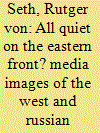

|
|
|
|
|
| Summary/Abstract |
National and foreign political identities are discursively constructed, not least through the media. Starting from the contention that Europe serves as the main Other used to define the idea of Russia, this article uses media texts (online and press) to analyse how Russia is constructed as a foreign policy actor in relation to Europe and the ‘West’ more generally. In so doing, the article draws on three discourses around Russia’s foreign policy: ‘Russia as Europe’; ‘Russia as part of Greater Europe’; and ‘Russia as Alternative Europe’. The article suggests that discursive developments in the 2000s have paved the way for a return of Cold War discourses in characterising relations between Russia and the West.
|
|
|
|
|
|
|
|
|
|
|
|
|
|
|
|
| 2 |
ID:
091966
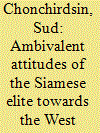

|
|
|
|
|
| Publication |
2009.
|
| Summary/Abstract |
Increasing and intensified political and cultural contact with the West during the colonial era constituted a serious concern for the Siamese elite. On the one hand, the kingdom needed to be modernized with Western-style knowledge and technology in order to survive. On the other hand, adopting Western civilization would lead to the loss of Siamese identity, which the elite wished to retain. They needed to select carefully which knowledge and culture from the West they considered to be 'civilized' and not harmful to their identity and political stability.
|
|
|
|
|
|
|
|
|
|
|
|
|
|
|
|
| 3 |
ID:
162071
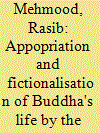

|
|
|
| 4 |
ID:
108951
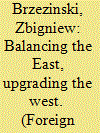

|
|
|
| 5 |
ID:
159276
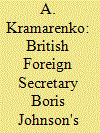

|
|
|
|
|
| Summary/Abstract |
BORIS JOHNSON, British Secretary of State for Foreign and Commonwealth Affairs, made a working visit to Moscow on December 22, 2017, during which he and his Russian counterpart Sergey Lavrov held talks on a wide range of issues on the bilateral agenda and relevant international topics. Regarding the results of the talks, both ministers spoke at a joint press conference of the need to restore mutual trust, and how the current state of relations between Moscow and London can in no way be called satisfactory. Hence the mutual desire for more effective collaboration in the international arena; in addition, the status of Russia and Britain as permanent members of the UN Security Council requires both this and the restoration of certain norms in bilateral relations. Johnson's visit was the first trip to Russia by a British foreign secretary in the last ten years. Why have there been no normal relations between Russia and Britain in recent years?
|
|
|
|
|
|
|
|
|
|
|
|
|
|
|
|
| 6 |
ID:
149697
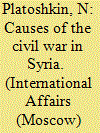

|
|
|
|
|
| Summary/Abstract |
THERE ARE ESSENTIALLY two theories regarding the causes of the civil war in Syria that are being promoted throughout the world by Western propaganda and intelligence agencies, as well as by Western satellites such as the "pillars of democracy" Qatar and Saudi Arabia.
|
|
|
|
|
|
|
|
|
|
|
|
|
|
|
|
| 7 |
ID:
023825
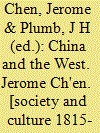

|
|
|
|
|
| Publication |
London, Hutchinson and Company, 1979.
|
| Description |
488p.
|
| Standard Number |
0091382106
|
|
|
|
|
|
|
|
|
|
|
|
Copies: C:1/I:0,R:0,Q:0
Circulation
| Accession# | Call# | Current Location | Status | Policy | Location |
| 018836 | 327.51073/CHE 018836 | Main | On Shelf | General | |
|
|
|
|
| 8 |
ID:
188466
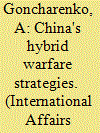

|
|
|
|
|
| Summary/Abstract |
THE TERM "warfare" has increasingly blurred boundaries in the 21st century, with countries coming up with new forms of conflicts against adversary states. This has led to the emergence of new terms such as "postmodern wars" [16], "mutiny wars" [4], and "network-centric warfare" [2]. The best-known of these new terms is "hybrid warfare," which came into being between the late 1990s and early 2000s. It is believed to have emerged in the US. Frank G. Hoffman was one of the first to write about changes to methods of warfare and to give a definition of hybrid warfare: "Hybrid threats incorporate a full range of different modes of warfare including conventional capabilities, irregular tactics and formations, terrorist acts including indiscriminate violence and coercion, and criminal disorder.... These multi-modal activities can be conducted by separate units, or even by the same unit, but are generally operationally and tactically directed and coordinated within the main battlespace to achieve synergistic effects in the physical and psychological dimensions of conflict" [19, p. 8]. Characteristics of a hybrid conflict arguably include
|
|
|
|
|
|
|
|
|
|
|
|
|
|
|
|
| 9 |
ID:
103205
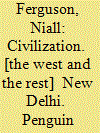

|
|
|
|
|
| Publication |
New Delhi, Penguin Books India Pvt Ltd, 2011.
|
| Description |
xxx, 402p.Pbk
|
| Standard Number |
9781846144561
|
|
|
|
|
|
|
|
|
|
|
|
Copies: C:1/I:0,R:0,Q:0
Circulation
| Accession# | Call# | Current Location | Status | Policy | Location |
| 055905 | 909.08/FER 055905 | Main | On Shelf | General | |
|
|
|
|
| 10 |
ID:
150609
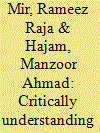

|
|
|
|
|
| Summary/Abstract |
A Critically and comprehensive understanding of geo-politics and causes of ‘War on terror’ is the fundamental objective of this paper. It is an attempt to enquire into the causes of War on Terror to see with-in whether it is really so or it sued into enhancing the hegemony of west. Because, since the days of the cold war and even before, the tussle, conflict and war has been initiated and fought by the powerful states to establish hegemony
|
|
|
|
|
|
|
|
|
|
|
|
|
|
|
|
| 11 |
ID:
114939
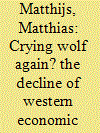

|
|
|
|
|
| Publication |
2012.
|
| Summary/Abstract |
Since the turn of the millennium, scholars and pundits have been musing over the decline of the West. The disappointing US military invasions in Afghanistan and Iraq, together with the subprime mortgage crisis, seem to be evidence of an abrupt end to America's 'unipolar' moment. In Europe, the sovereign debt crisis has amplified Europe's long-term structural economic problems and laid bare the fragile institutional foundation on which the Economic and Monetary Union was built. At the same time, the BRICs and other emerging economies have been growing at unprecedented rates. Those same analysts see a 'decoupling' in the world economy: the developing economies pulling the world out of recession, while the advanced industrial economies are unable to solve their domestic difficulties. So to them, the events of the past five years signify the beginning of the end of Western influence, eventually leading to a more complete rebalancing of the world economy's current 'Western' system of governance. This article argues instead that the West still has a significant edge when it comes to most critical factors that determine long-term economic growth potential, including technology, innovative capacity, research and development, investment climate and education. Furthermore, the transatlantic economy is less vulnerable than the rest of the world to outside economic shocks and might eventually prove more capable of reform than many expect. The current malaise in the transatlantic community might therefore prove once again to be more cyclical than structural. Relying on linear projections, many are 'crying wolf' again, too loud and too soon.
|
|
|
|
|
|
|
|
|
|
|
|
|
|
|
|
| 12 |
ID:
126671
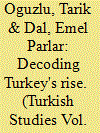

|
|
|
|
|
| Publication |
2013.
|
| Summary/Abstract |
Acknowledging Turkey as a rising power, and having commonalities in both objectives and outcomes with the other rising Southern powers, this study is a modest attempt to decode Turkey's rise with/within the West discursively and empirically and at multiple levels: systemic, regional and agent-based domestic. It aims to contribute to the debate over rising powers by developing new conceptualizations and challenging or reinterpreting the existing theoretical approaches in order to define Turkey's current power status vis-á-vis both other rising powers and the major Western powers. Turkey's recent rise, which has also been characterized by the country's high economic growth, must be nuanced from that of the Global South countries in some principal aspects. Unlike other rising powers, the Western factor weights more heavily in Turkey's recent rise. This issue's novel contribution to the existing literature on Turkish foreign policy is its attempt to understand Turkey's current rise, as well as its limitations in the context of its decades-long institutionalized and strategic relations with the West.
|
|
|
|
|
|
|
|
|
|
|
|
|
|
|
|
| 13 |
ID:
152640
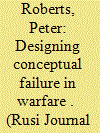

|
|
|
|
|
| Summary/Abstract |
In this examination of modern warfare doctrine and strategies, Peter Roberts argues that Western militaries are constrained by thirteenth-century theological philosophy and Napoleonic dogma, while their enemies have leapt ahead into the twenty-first century – not simply in technological terms, but in the very way they have reimagined warfare.
|
|
|
|
|
|
|
|
|
|
|
|
|
|
|
|
| 14 |
ID:
182946
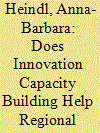

|
|
|
|
|
| Summary/Abstract |
To avoid the middle-income trap, China’s leaders call for innovation to accelerate development in China. However, since it is not clear how innovation and (regional) development reinforce each other, there is no blueprint strategy for successful innovation capacity building throughout China. Due to resource scarcity in its “Western” regions, it is thus far from certain that innovation capacity building will support regional development. Departing from sociology of knowledge, narrations are constitutive of policy practice. This article analyses narrative patterns of policy experts to understand how innovation capacity building and regional development are negotiated in China’s lagging “West.” The comparison of Yunnan and Chongqing cases demonstrates that innovation capacity building is primarily infused with theoretical expectations: resource scarcity does not allow for grounding innovation as a strategy of regional development in the local context. This leads to narrations of “local” alternatives to innovation capacity building in centralist China.
|
|
|
|
|
|
|
|
|
|
|
|
|
|
|
|
| 15 |
ID:
095094
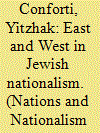

|
|
|
|
|
| Publication |
2010.
|
| Summary/Abstract |
This article analyses the ethnic and civic components of the early Zionist movement. The debate over whether Zionism was an Eastern-ethnic nationalist movement or a Western-civic movement began with the birth of Zionism. The article also investigates the conflict that broke out in 1902 surrounding the publication of Herzl's utopian vision, Altneuland. Ahad Ha'am, a leader of Hibbat Zion and 'Eastern' cultural Zionism, sharply attacked Herzl's 'Western' political Zionism, which he considered to be disconnected from the cultural foundations of historical Judaism. Instead, Ahad Ha'am supported the Eastern Zionist utopia of Elchanan Leib Lewinsky. Hans Kohn, a leading researcher of nationalism, distinguished between 'Eastern' and 'Western' nationalist movements. He argued that Herzl's political heritage led the Zionist movement to become an Eastern-ethnic nationalist movement. The debate over the character of Jewish nationalism - ethnic or civic - continues to engage researchers and remains a topic of public debate in Israel even today. As this article demonstrates, the debate between 'Eastern' and 'Western' Zionism has its foundations in the origins of the Zionist movement. A close look at the vision held by both groups challenges Kohn's dichotomy as well as his understanding of the Zionist movement.
|
|
|
|
|
|
|
|
|
|
|
|
|
|
|
|
| 16 |
ID:
154477
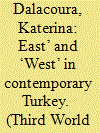

|
|
|
|
|
| Summary/Abstract |
The tired old civilisational categories of ‘East’ and ‘West’, loosely identified with ‘Islam’ and ‘modernity’, are alive and well, nowhere more so than in contemporary Turkey. The Justice Development Party (AKP) currently in government employs them assiduously to political advantage but they have a long history, having defined the parameters of societal identity and political discourse throughout the history of the Turkish Republic. The paper takes the strength of the categories as its starting point but moves beyond them by asking if discourses, narratives and identities, individual and collective, exist in Turkey which question, overcome and ultimately undermine the categories of ‘East’ and ‘West’. The paper starts by investigating the evolution of ideas about East and West since the late Ottoman period and accepts that they are still dominant. However, since the 1980s in particular, they are being undermined in a de facto way by cultural developments in literature and music, new trends in historiography and novel ways of relating to the past. In some ways in contemporary Turkey, the paper concludes, culture trumps the inherently essentialist idea of ‘civilisation’ and Turkish society is ahead of its political and intellectual elites.
|
|
|
|
|
|
|
|
|
|
|
|
|
|
|
|
| 17 |
ID:
072731
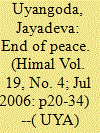

|
|
|
| 18 |
ID:
189189
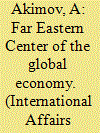

|
|
|
|
|
| Summary/Abstract |
RECENT statistics suggest that China, Japan, and South Korea are increasingly forming an economic unit comparable to the West. One naturally wonders whether this unit is going to become a formal association of some kind and whether such an association would counterbalance the West. There are no answers yet, but the three East Asian countries do possess the resources to form an economic center equal in scale and significance to the West. Let us tentatively label China, Japan, and South Korea the Far Eastern Economic Center (FEEC).
|
|
|
|
|
|
|
|
|
|
|
|
|
|
|
|
| 19 |
ID:
143720
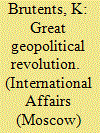

|
|
|
|
|
| Summary/Abstract |
IN A NUTSHELL, our time is best defined as a "time of changes." Changes have spread far and wide to practically all sides of life. They differ in scope and impact from local to unprecedentedly consequential and from political makeup to crucial shifts; they are responsible, to a great and increasing degree, for the image of the present and for our future.
|
|
|
|
|
|
|
|
|
|
|
|
|
|
|
|
| 20 |
ID:
184904


|
|
|
|
|
|
|
|